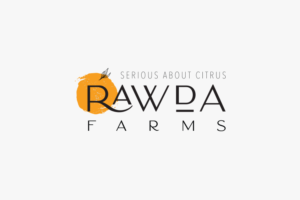Rawda Farms is a family-owned citrus grove founded in 1971 and located in Akkar-North Lebanon. The family has been growing citrus for five-generations and root back to 19th century in Chiah, South Beirut. Today, Rawda Farms is led by the youngest generation, motivated to revolutionize not only the agricultural techniques used, but also the approach it has with its consumers.
DID YOU KNOW?
During Lebanon’s ‘Golden Age’ of Citrus, the industry formed about half of the country’s entire agricultural production. Most citrus fruit varieties in Lebanon were introduced in the 1960s and have been cultivated in Lebanon for such a long time that they are now considered local varieties. The family has been in the citrus industry since as far as 1757 when they immigrated from Mount-Lebanon to the coastal town of Chiah where citrus production was thriving. In the 1950’s the family exported citrus fruits to Czechoslovakia and the URSS, and in the 1960’s they started producing orange juices. The late Antoine Gharios established Rawda Farms in 1971 in Akkar.
WHAT’S THE INNOVATION?
The innovation starts first at the production level. Several new varieties of citrus have been introduced to cope with an evolving taste and market. Also, new agricultural techniques imported from Spain were introduced to the farm at the pruning, fertilization and pesticide application levels. IPM guidelines were followed aiming to obtain a certification and start an Integrated Production system for the Citrus growers in Akkar and hopefully in all of Lebanon. Finally, a change of the marketing strategy was done to introduce farmer to consumer lines, such as by-products and processed products.
WHAT’S THE STORY BEHIND THE INNOVATION?
Two years ago, Georges took over the management of the farm after the passing of its founder, Antoine Gharios. He worked at developing and innovating the work at several levels especially after he pursued an extensive technical training with a Spanish citrus expert. They discussed the potential growth opportunities that are related to drastic changes at the production level, post-harvesting level and at the business model as a whole to benefit the farm, the environment, and the consumer.
WHY IS IT IMPORTANT?
Introducing IPM guidelines helps Rawda farms produce healthy, pesticide-reduced citrus fruits. The consumer will benefit from safe and sustainable fruits. Integrated production is an agricultural system of production of plants using farming techniques that ensure sustainable agriculture, using methods of integrated pest management compatible with environmental protection, agricultural productivity and the use of natural production mechanisms and resources. Innovating in modern cultural practices have also directly positively impacted the finances of the farm, while also reducing our pesticide application costs and weed management costs. Aside from the environmental benefits of using fewer pesticides, Rawda Farms believes in the importance of adjustment during the financial crisis that is hitting Lebanon. On the shift of the marketing strategy, they have seen a growing interest by the consumer for fresh and well-sourced products directly from the grower/farmer.
WHO IS BENIFITTING?
Rawda Farms has decided to invest in cutting the lines between the farmer and the client, and sensitize the consumer on healthy produce. They have initiated a social media campaigns to educated the consumer on the different varieties of citrus, their utilization, and their growing seasons, specifically as this pertains to our region. Rawda Farms believes that this is a very important message to pass as well. While the farm benefits from the innovation, the consumers do too.



